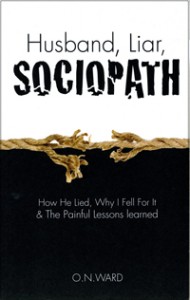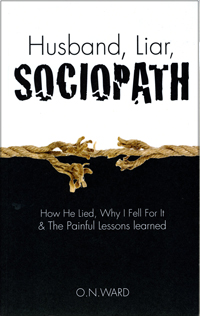By O.N. Ward
Every week, a chapter of my book, “Husband, Liar, Sociopath: How He Lied, Why I Fell For It & The Painful Lessons Learned” (available via Amazon.com, just click on the title or book cover) will be published here on Lovefraud. To read prior chapters, please see the links at the bottom of the post.
Chapter 14: Danger! Bridge Out Ahead
“Our honeymoon isn’t over until I say it’s over” was not just a red flag, it was an oversized, florescent red flag accompanied by blaring sirens and fireworks. Why did I miss what is so obvious in hindsight? I did not understand that people like Paul really exist in the world, not just in movies or as someone else’s husband on shows like 48 Hours. It wasn’t that I thought I was special or immune to negative experiences, I simply had no idea how common sociopaths are, what amazing actors and manipulators they are, that anyone can become a target, and that everyone needs to know the signs that may signal they are involved with a sociopath. It was not something I ever considered, especially not on the final day of my honeymoon, but how many of us would have dissolved a one-week old marriage on the basis of a single comment? I should have. Paul’s comment was a rare gift, because it illuminated a fatal flaw. It was a glimpse into the real Paul. It was not the comment of a good guy having a bad day or being stressed out from work or overly fatigued or anything else for that matter. His remark demonstrated that Paul viewed me as a possession to be controlled. This is not normal, and it is certainly not healthy. This is how sociopaths view those they are grooming for future exploitation.
I was not so naive as to think that good marriages should be devoid of conflict and compromise. To the contrary, I realized that living in such a way that allows two people’s needs and long-term goals to be accommodated is a difficult dance, requiring the resolution of conflicts and misunderstandings, solving problems, and probably shedding a few tears along the way. However, not all marital problems are equal. Some are solvable and common even in the healthiest of marriages. Alternatively, some are symptoms of malignant, cancerous people and relationships. It is important to understand if a lack of empathy, a lack of a conscience, and a need to control are the root cause of any conflict. These are deal breakers. They are perilous and cannot be fixed. If you find yourself in such a situation, you must escape.
Think of a small boat heading out into the ocean, suddenly taking on a small amount of water after leaving the dock. Before heading farther out to sea, away from the safety of land, wouldn’t it be prudent to understand if the leak can be patched easily or if it is a symptom of a dangerous problem that is guaranteed to get worse? Patching things up, not understanding the root cause of the problem, and sailing off into the sunset may feel good at the moment, but it will be disastrous and even deadly in some cases. The same is true of a relationship with a sociopath. There is no fixing it. It will not end well, and the farther you get from shore, the more likely it is that when you finally see the problem for what it is, you will be in grave danger—emotionally, financially, and even physically.
The reason I should have ended the relationship after the “Our honeymoon isn’t over until I say it’s over!” comment and the subsequent discussion with Paul was that these interactions contained clear signs of sociopath math at work. In Paul’s mind, I existed to serve his needs—a relaxing final night to his honeymoon. My need to preserve my career by finding out where to be the next morning counted for nothing. It is hard for nonsociopaths to comprehend that such behavior could be caused by an inability to feel empathy for another person. This is something that most of us do not even know to consider. We have empathy, so it never crosses our minds that many people do not—and never will. Instead, nonsociopaths persist in concluding: “I must have misunderstood,” “I must be missing the big picture,” “There are always two sides to any conflict,” “I must have done something wrong,” and “He must have been tired.” However, once you understand a sociopath’s ever-present mental equation, it is time to stop asking these questions or explaining away or excusing his selfish, controlling behavior. When someone assigns no importance to other human beings, the most self-serving behavior, even over the littlest thing, becomes possible and, ultimately, the norm.
One person wanting to control another and placing zero value on another person’s needs, when those needs clearly should be the priority, is dangerous! This is how many women end up dead, by getting involved with or marrying someone who needs to control them. No one but you should control your destiny. If another human feels entitled to govern your thoughts, opinions, relationships, actions, or movements, run fast, run far, and don’t look back! Keep in mind, however, that getting out of a relationship with a sociopath can be treacherous and may require guidance from experts.
Start from the beginning:
Go to previous chapter:
Go to next chapter:
Notes
Identifying names, places, events, characteristics, etc. that I discuss here and in my book have been altered to protect the identity of everyone involved.





































 After Unwittingly Falling In Love With A Sociopath: Feeling “Off,” Subtle Anxiety, And A Sense of Unease
After Unwittingly Falling In Love With A Sociopath: Feeling “Off,” Subtle Anxiety, And A Sense of Unease
becomingstrong
Thank you ON Ward. I was look forward to your next installment on Paul. Your lesson about red flags is important. Yes you should have left after Paul’s comment but how many of us would have? A few perhaps but it would the majority of us so many red flags that we cannot tuck them away. My lawyer told me a while ago, “I try not to judge but you stayed too long. I’ve said this to 2 clients” (by the way she has been in practice for almost 40 years). I also like your metaphor of the sinking boat. Who wants to be at sea, with no land insight, in a boat that is unfixable and most definitely will sink? One thing is for sure and that is Paul no longer gets the benefit of your company, wisdom and talent.
becomingstrong
Correction: I always look forward to your next installment on Paul.
regretfullymine
buy the book about Paul & ON WARD, as I did; its one of the few books about psychopaths in long term marriage/relationship; life with men like these is like a bad nightmare that never ends..it just goes on and on and on, until YOU decide to do something, whatever it takes, to make the pain GO AWAY. Sometimes it takes ‘hitting bottom’ as I did, to do one small step at a time towards being free. I lost a lot of years to this man; I choose NOT to lose anymore time.
Hope Springs
Yes, we live to serve them. That is what they think. There is always an agenda with P/SPs that can only come from a lack of empathy.
Like becomingstrong, I too look forward to more of the ‘Paul’ saga…
slimone
It is so true that not knowing about sociopaths, and their prevalence, is a real handicap. I was involved with multiple of these types (over the decades), until the last ‘relationship’ losses (money, self-esteem) were so incredibly painful and big that I finally did the research and found out about personality disorders. This was a complete revelation to me. I was able to identify these types in my family (my mother and her father), AND to look back and see how many red flags I didn’t heed.
I would guess that about 35-40% of the human population has some level of ‘disorder’. Maybe not full out psychopaths but narcissistic enough that they aren’t worth the trouble. That means we are bumping up against this kind of person on a fairly regular basis. I am very grateful to be able to spot a lot of this behavior and steer clear.
I was not so grateful when I had my first aha moments. I was sad, incredibly sad and depressed. But as I healed up and was able to look at my choices, my naivete, and how much I had been subjected to over the years, I was able to cultivate gratitude for this ‘understanding’ of human nature. It has changed my life for the (MUCH) better.
Medcode23
Hey y’all! I made a group in regards to narcisstic mates and psychopaths and sociopaths. Feel free to join!
https://m.facebook.com/groups/1728641120759069